Charles E W Bean, Diaries, AWM38 3DRL 606/255/1 - 1916 - 1937 - Part 6
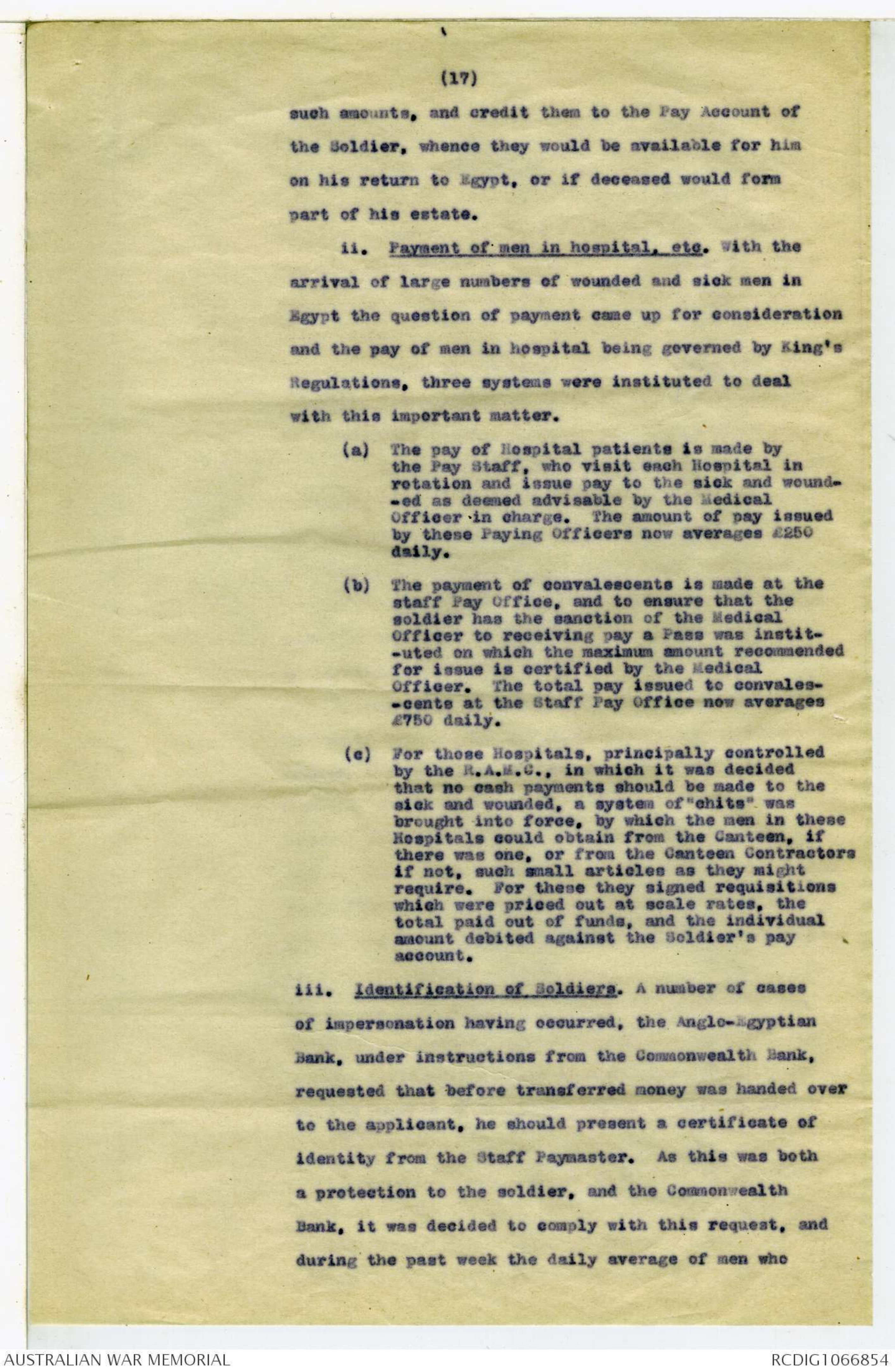
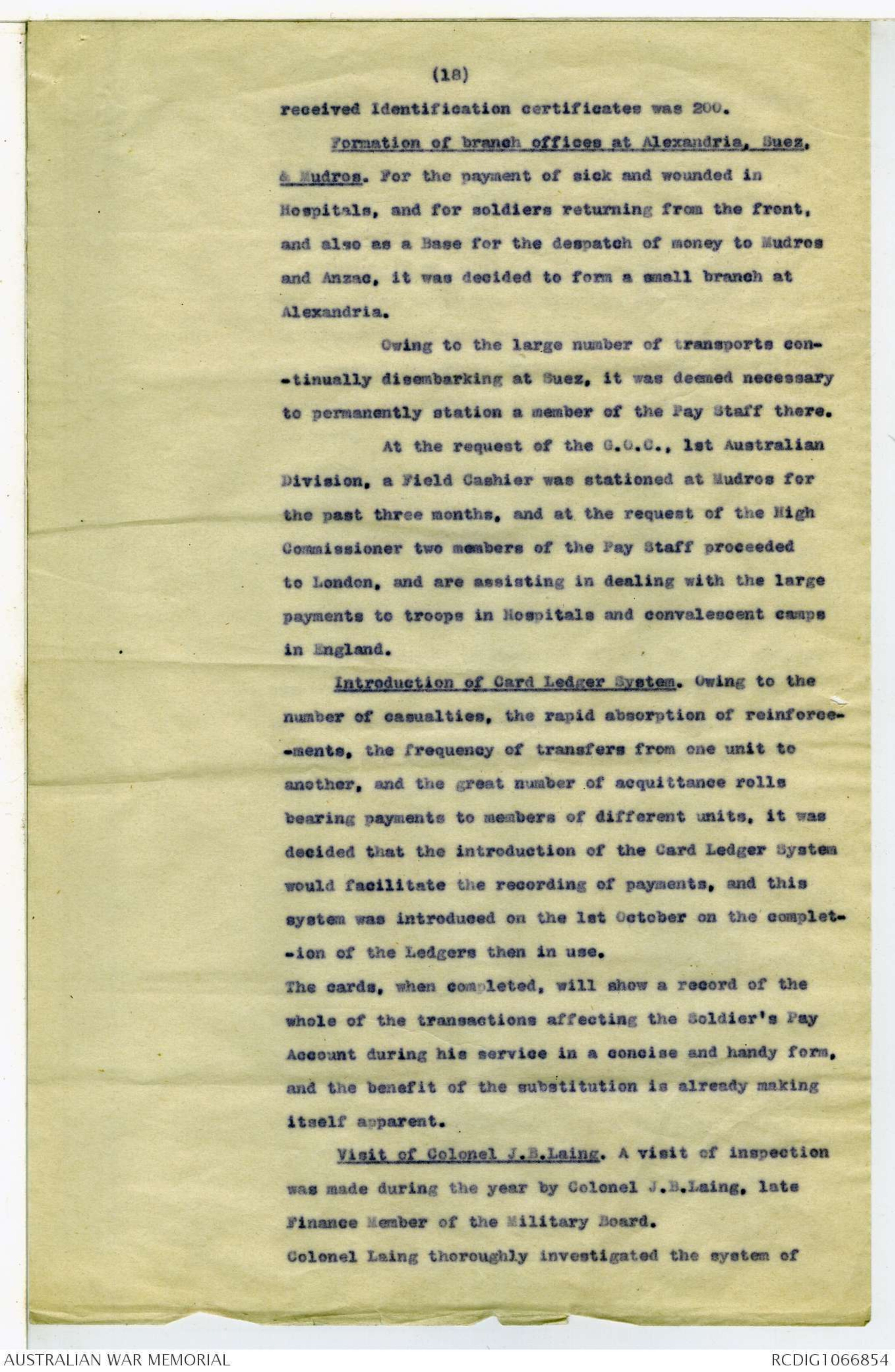
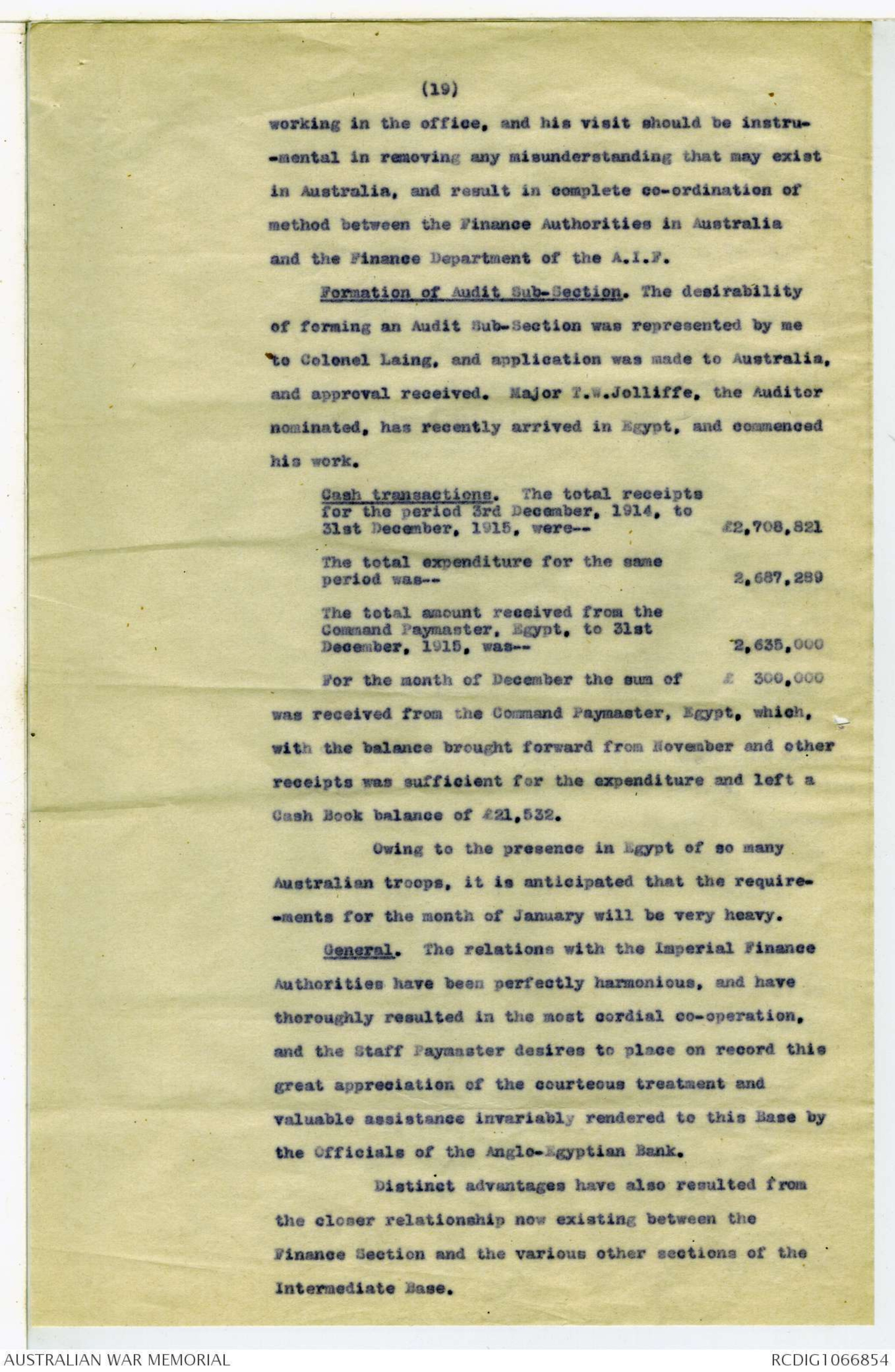
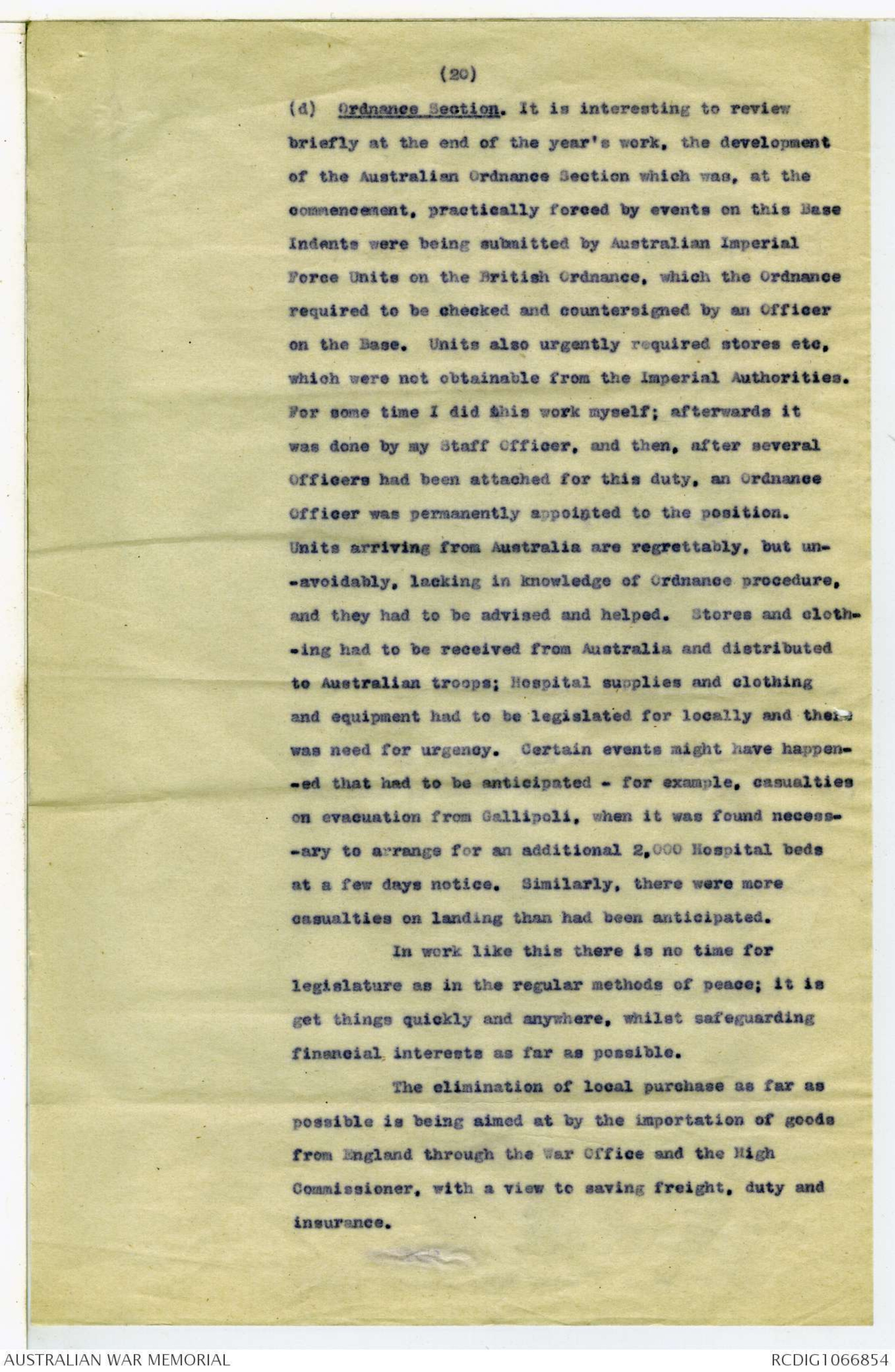
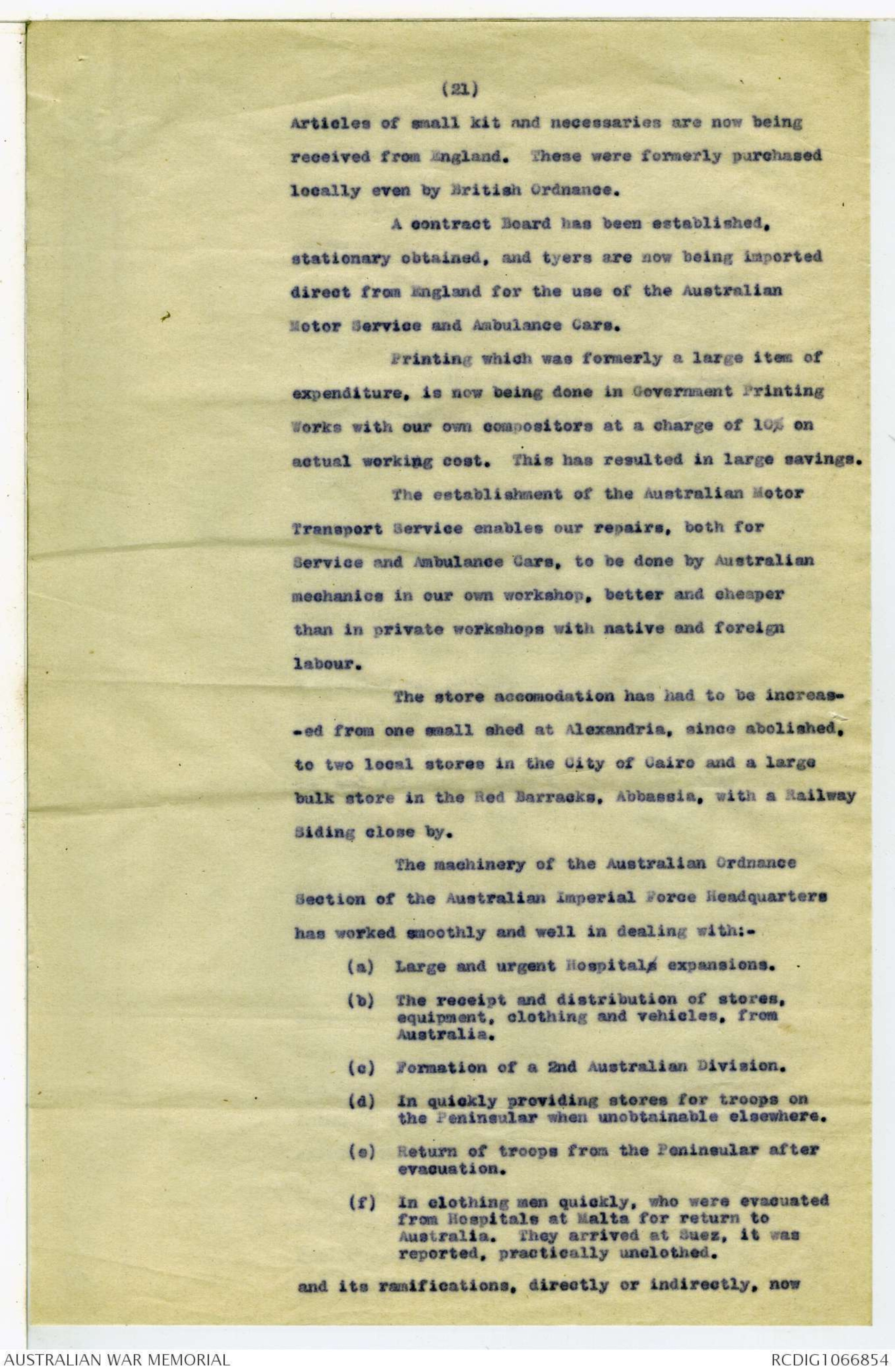
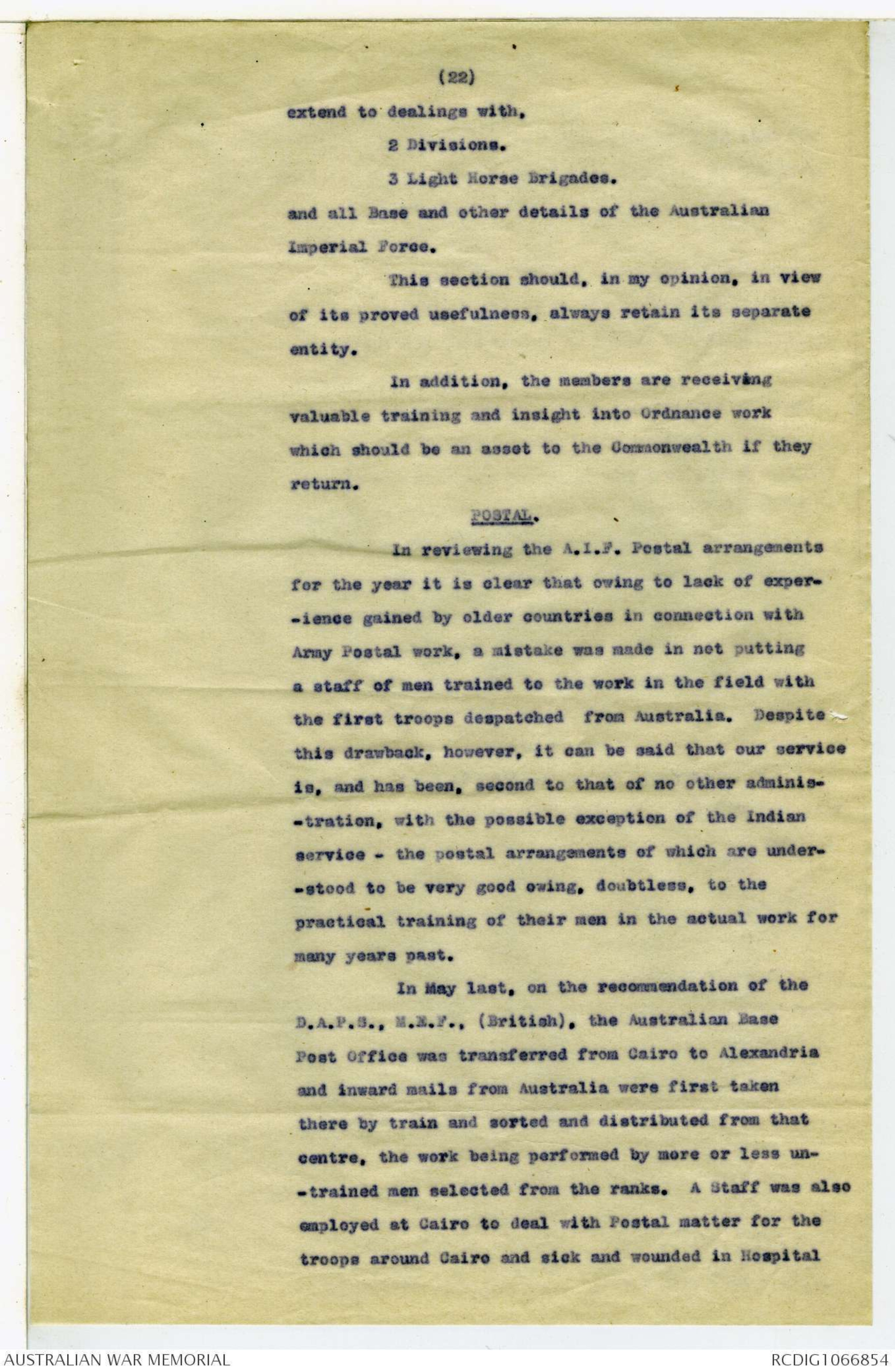
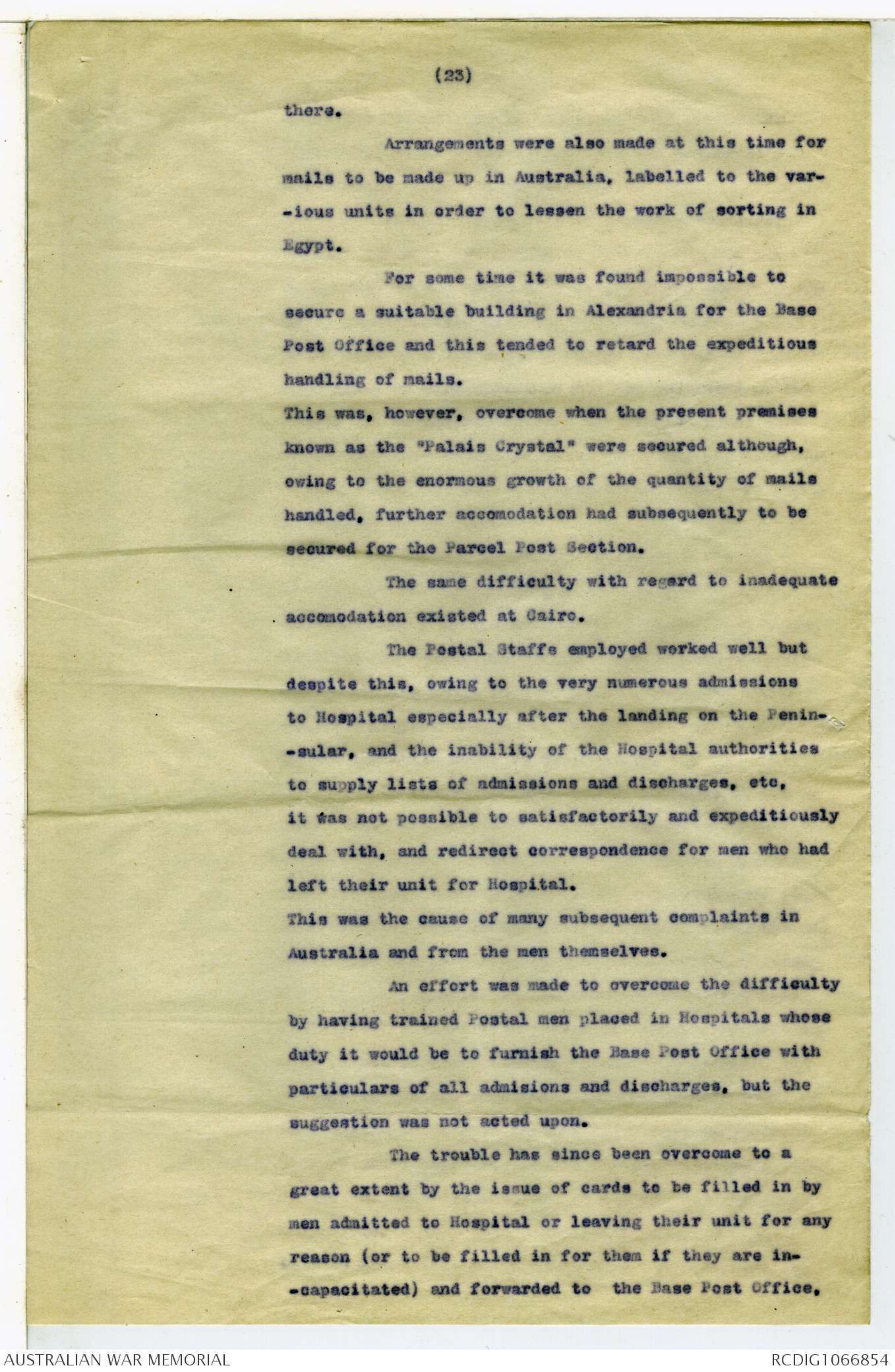
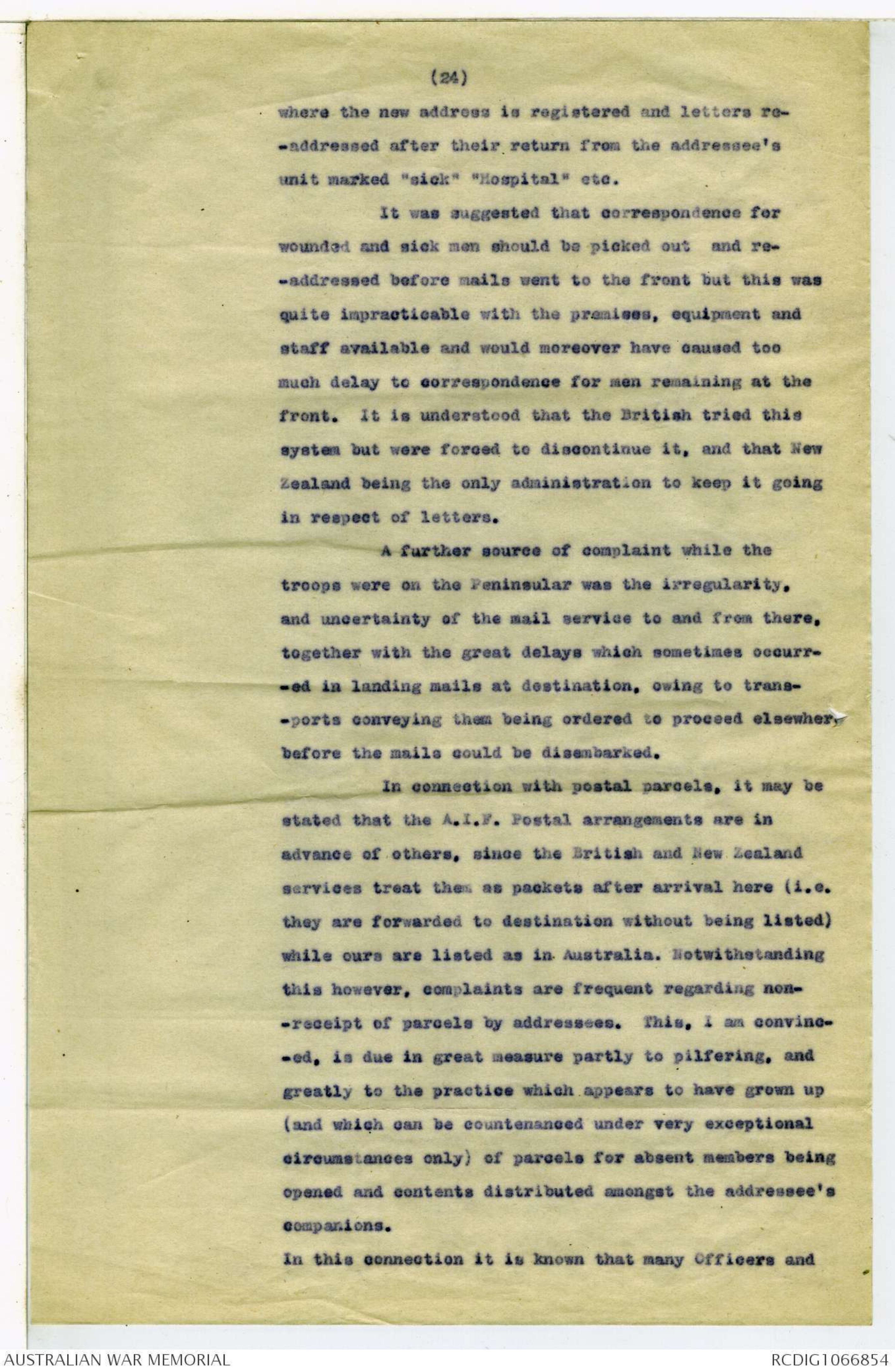
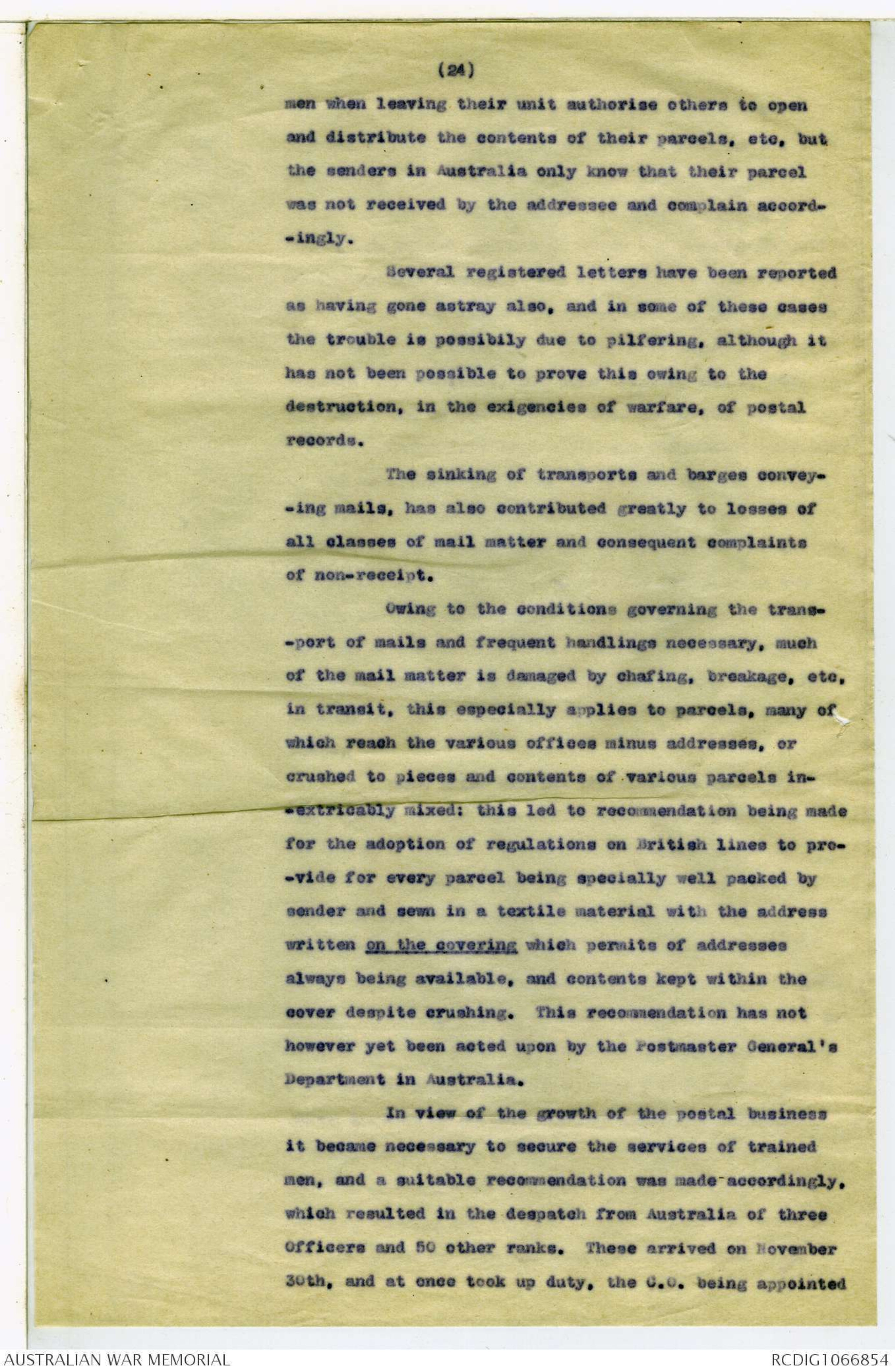
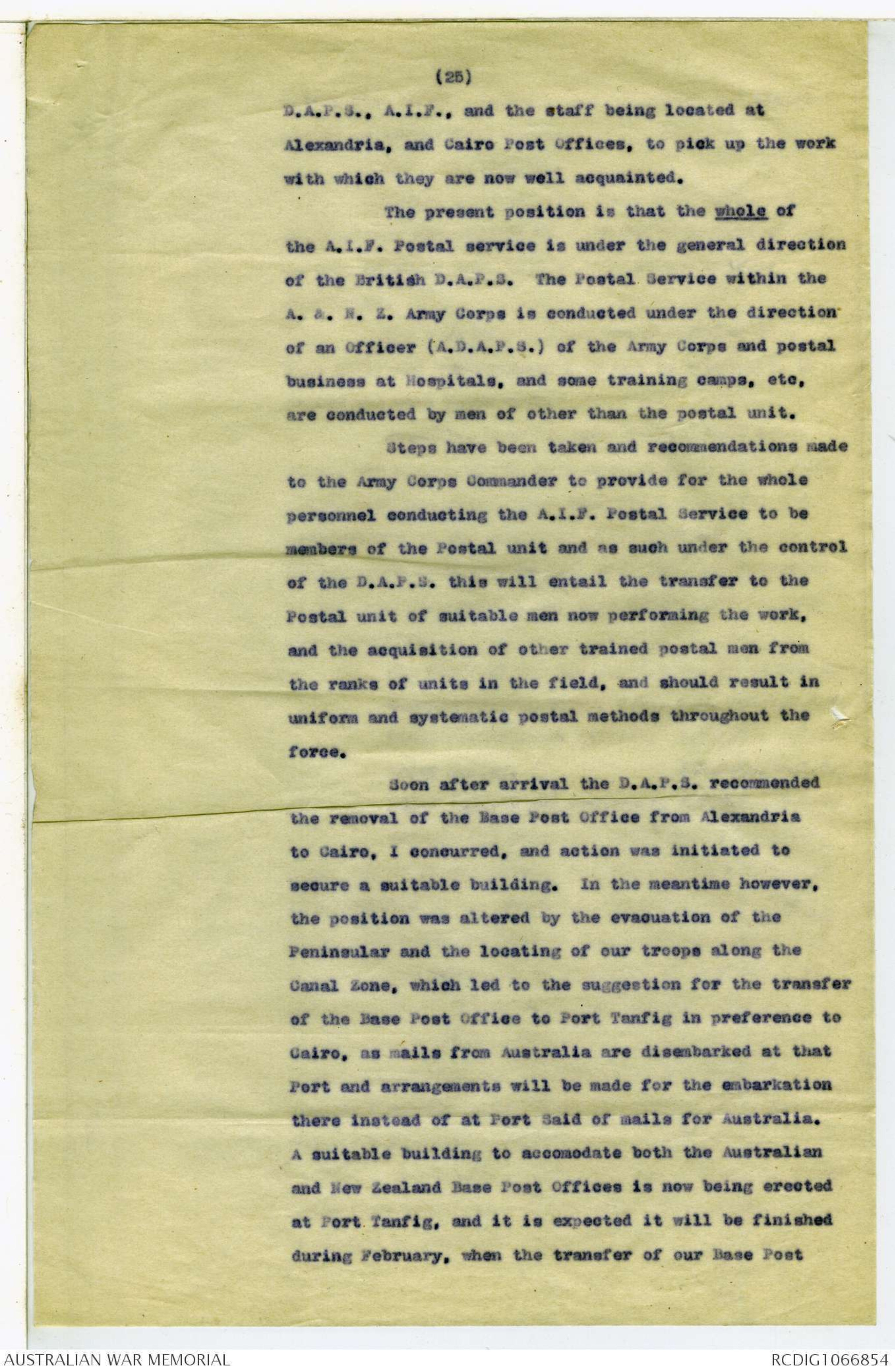
(17)
such amounts, and credit them to the Pay Account of
the Soldier, whence they would be available for him
on his return to Egypt, or if deceased would form
part of his estate.
ii. Payment of men in hospital, etc. With the
arrival of large numbers of wounded and sick men in
Egypt the question of payment came up for consideration
and the pay of men in hospital being governed by King's
Regulations, three systems were instituted to deal
with this important matter.
(a) The pay of Hospital patients is made by
the Pay Staff, who visit each Hospital in
rotation and issue pay to the sick and wounded
as deemed advisable by the Medical
Officer in charge. The amount of pay issued
by these Paying Officers now averages £250
daily.
(b) The payment of convalescents is made at the
staff Pay Office, and to ensure that the
soldier has the sanction of the Medical
Officer to receiving pay a Pass was instituted
on which the maximum amount recommended
for issue is certified by the Medical
Officer. The total pay issued to convalescents
at the Staff Pay Office now averages
£750 daily.
(c) For those Hospitals, principally controlled
by the R.A.M.C., in which it was decided
that no cash payments should be made to the
sick and wounded, a system of "chits" was
brought into force, by which the men in these
Hospitals could obtain from the Canteen, if
there was one, or from the Canteen Contractors
if not, such small articles as they might
require. For these they signed requisitions
which were priced out at scale rates, the
total paid out of funds, and the individual
amount debited against the Soldier's pay
account.
iii. Identification of Soldiers. A number of cases
of impersonation having occurred, the Anglo-Egyptian
Bank, under instructions from the Commonwealth Bank,
requested that before transferred money was handed over
to the applicant, he should present a certificate of
identity from the Staff Paymaster. As this was both
a protection to the soldier, and the Commonwealth
Bank, it was decided to comply with this request, and
during the past week the daily average of men who
(18)
received Identification certificates was 200.
Formation of branch offices at Alexandria, Suez,
& Mudros. For the payment of sick and wounded in
Hospitals, and for soldiers returning from the front,
and also as a Base for the despatch of money to Mudros
and Anzac, it was decided to form a small branch at
Alexandria.
Owing to the large number of transports continually
disembarking at Suez, it was deemed necessary
to permanently station a member of the Pay Staff there.
At the request of the G.O.C., 1st Australian
Division, a Field Cashier was stationed at Mudros for
the past three months, and at the request of the High
Commissioner two members of the Pay Staff proceeded
to London, and are assisting in dealing with the large
payments to troops in Hospitals and convalescent camps
in England.
Introduction of Card Ledger System. Owing to the
number of casualties, the rapid absorption of reinforcements,
the frequency of transfers from one unit to
another, and the great number of acquittance rolls
bearing payments to members of different units, it was
decided that the introduction of the Card Ledger System
would facilitate the recording of payments, and this
system was introduced on the 1st October on the completion
of the Ledgers then in use.
The cards, when completed, will show a record of the
whole of the transactions affecting the Soldier's Pay
Account during his service in a concise and handy form,
and the benefit of the substitution is already making
itself apparent.
Visit of Colonel J.B.Laing. A visit of inspection
was made during the year by Colonel J.B.Laing, late
Finance Member of the Military Board.
Colonel Laing thoroughly investigated the system of
(19)
working in the office, and his visit should be instrumental
in removing any misunderstanding that may exist
in Australia, and result in complete co-ordination of
method between the Finance Authorities in Australia
and the Finance Department of the A.I.F.
Formation of Audit Sub-Section. The desirability
of forming an Audit Sub-Section was represented by me
to Colonel Laing, and application was made to Australia,
and approval received. Major T.W.Jolliffe, the Auditor
nominated, has recently arrived in Egypt, and commenced
his work.
Cash transactions. The total receipts
for the period 3rd December, 1914,
31st December, 1915, were-- £2,700,821
The total expenditure for the same
period was-- 2,687,289
The total amount received from the
Command Paymaster, Egypt, to 31st
December, 1915, was-- 2,635,000
For the month of December the sum of £ 300,000
was received from the Command Paymaster, Egypt, which,
with the balance brought forward from November and other
receipts was sufficient for the expenditure and left a
Cash Book balance of £21,532.
Owing to the presence in Egypt of so many
Australian troops, it is anticipated that the requirements
for the month of January will be very heavy.
General. The relations with the Imperial Finance
Authorities have been perfectly harmonious, and have
thoroughly resulted in the most cordial co-operation,
and the Staff Paymaster desires to place on record this
great appreciation of the courteous treatment and
valuable assistance invariably rendered to this Base by
the Officials of the Anglo-Egyptian Bank.
Distinct advantages have also resulted from
the closer relationship now existing between the
Finance Section and the various other sections of the
Intermediate Base.
(20)
(d) Ordnance Section. It is interesting to review
briefly at the end of the year's work, the development
of the Australian Ordnance Section which was, at the
commencement, practically forced by events on this Base
Indents were being submitted by Australian Imperial
Force Units on the British Ordnance, which the Ordnance
required to be checked and countersigned by an Officer
on the Base. Units also urgently required stores etc.
which were not obtainable from the Imperial Authorities.
For some time I did this work myself; afterwards it
was done by my Staff Officer, and then, after several
Officers had been attached for this duty, an Ordnance
Officer was permanently appointed to the position.
Units arriving from Australia are regrettably, but unavoidably,
lacking in knowledge of Ordnance procedure,
and they had to be advised and helped. Stores and clothing
had to be received from Australia and distributed
to Australian troops; Hospital supplies and clothing
and equipment had to be legislated for locally and there
was need for urgency. Certain events might have happened
that had to be anticipated - for example, casualties
on evacuation from Gallipoli, when it was found necessary
to arrange for an additional 2,000 Hospital beds
at a few days notice. Similarly, there were more
casualties on landing than had been anticipated.
In work like this there is no time for
legislature as in the regular methods of peace; it is
get things quickly and anywhere, whilst safeguarding
financial interests as far as possible.
The elimination of local purchase as far as
possible is being simed at by the importation of goods
from England through the War Office and the High
Commissioner, with a view to saving freight, duty and
insurance.
(21)
Articles of small kit and necessaries are now being
received from England. These were formerly purchased
locally even by British Ordnance.
A contract Board has been established,
stationary obtained, and tyers are now being imported
direct from England for the use of the Australian
Motor Service and Ambulance Cars.
Printing which was formerly a large item of
expenditure, is now being done in Government Printing
Works with our own compositors at a charge of 10% on
actual working cost. This has resulted in large savings.
The establishment of the Australian Motor
Transport Service enables our repairs, both for
Service and Ambulance Cars, to be done by Australian
mechanics in our own workshop, better and cheaper
than in private workshops with native and foreign
labour.
The store accomodation has had to be increased
from one small shed at Alexandria, since abolished,
to two local stores in the City of Cairo and a large
bulk store in the Red Barracks, Abbassia, with a Railway
Siding close by.
The machinery of the Australian Ordnance
Section of the Australian Imperial Force Headquarters
has worked smoothly and well in dealing with:-
(a) Large and urgent Hospitals expansions.
(b) The receipt and distribution of stores,
equipment, clothing and vehicles, from
Australia.
(c) Formation of a 2nd Australian Division.
(d) In quickly providing stores for troops on
the Peninsular when unobtainable elsewhere.
(e) Return of troops from the Peninsular after
evacuation.
(f) In clothing men quickly, who were evacuated
from Hospitals at Malta for return to
Australia. They arrived at Suez, it was
reported, practically unclothed.
and its ramifications, directly or indirectly, now
(22)
extend to dealings with,
2 Divisions.
3 Light Horse Brigades.
and all Base and other details of the Australian
Imperial Force.
This section should, in my opinion, in view
of its proved usefulness, always retain its separate
entity.
In addition, the members are receiving
valuable training and insight into Ordnance work
which should be an asset to the Commonwealth if they
return.
POSTAL.
In reviewing the A.l.F. Postal arrangements
for the year it is clear that owing to lack of experience
gained by older countries in connection with
Army Postal work, a mistake was made in not putting
a staff of men trained to the work in the field with
the first troops despatched from Australia. Despite
this drawback, however, it can be said that our service
is, and has been, second to that of no other administration,
with the possible exception of the Indian
service - the postal arrangements of which are understood
to be very good owing, doubtless, to the
practical training of their men in the actual work for
many years past.
In May last, on the recommendation of the
D.A.P.S., M.E.F., (British), the Australian Base
Post Office was transferred from Cairo to Alexandria
and inward mails from Australia were first taken
there by train and sorted and distributed from that
centre, the work being performed by more or less untrained
men selected from the ranks. A Staff was also
employed at Cairo to deal with Postal matter for the
troops around Cairo and sick and wounded in Hospital
(23)
there.
Arrangements were also made at this time for
mails to be made up in Australia, labelled to the various
units in order to lessen the work of sorting in
Egypt.
For some time it was found impossible to
secure a suitable building in Alexandria for the Base
Post Office and this tended to retard the expeditious
handling of mails.
This was, however, overcome when the present premises
known as the "Palais Crystal" were sccured although,
owing to the enormous growth of the quantity of mails
handled, further accomodation had subsequently to be
secured for the Parcel Post Section.
The same difficulty with regard to inadequate
accomodation existed at Cairo.
The Postal Staffs employed worked well but
despite this, owing to the very numerous admissions
to Hospital especially after the landing on the Peninsular,
and the inability of the Hospital authorities
to supply lists of admissions and discharges, etc,
it was not possible to satisfactorily and expeditiously
deal with, and redirect correspondence for men who had
left their unit for Hospital.
This was the cause of many subsequent complaints in
Australia and from the men themselves.
An effort was made to overcome the difficulty
by having trained Postal men placed in Hospitals whose
duty it would be to furnish the Base Post Office with
particulars of all admisions and discharges, but the
suggestion was not acted upon.
The trouble has since been overcome to a
great extent by the issue of cards to be filled in by
men admitted to Hospital or leaving their unit for any
reason (or to be filled in for them if they are incapacitated)
and forwarded to the Base Post Office,
(24)
where the new address is registered and letters readdressed
after their return from the addressee's
unit marked "sick" "Hospital" etc.
It was suggested that correspondence for
wounded and sick men should be picked out and readdressed
before mails went to the front but this was
quite impracticable with the premises, equipment and
staff available and would moreover have caused too
much delay to correspondence for men remaining at the
front. It is understood that the British tried this
system but were forced to discontinue it, and that New
Zealand being the only administration to keep it going
in respect of letters.
A further source of complaint while the
troops were on the Peninsular was the irregularity,
and uncertainty of the mail service to and from there,
together with the great delays which sometimes occurred
in landing mails at destination, owing to transports
conveying them being ordered to proceed elsewhere
before the mails could be disembarked.
In connection with postal parcels, it may be
stated that the A.I.F. Postal arrangements are in
advance of others, since the British and New Zealand
services treat them as packets after arrival here (i.e.
they are forwarded to destination without being listed)
while ours are listed as in Australia. Notwithstanding
this however, complaints are frequent regarding nonreceipt
of parcels by addressees. This. I am convinced,
is due in great measure partly to pilfering, and
greatly to the practice which appears to have grown up
(and which can be countenanced under very exceptional
circumstances only) of parcels for absent members being
opened and contents distributed amongst the addressee's
companions.
In this connection it is known that many Officers and
(24)
men when leaving their unit authorise others to open
and distribute the contents of their parcels, etc, but
the senders in Australia only know that their parcel
was not received by the addressee and complain accordingly.
Several registered letters have been reported
as having gone astray also, and in some of these cases
the trouble is possibily due to pilfering, although it
has not been possible to prove this owing to the
destruction, in the exigencies of warfare, of postal
records.
The sinking of transports and barges conveying
mails, has also contributed greatly to losses of
all classes of mail matter and consequent complaints
of non-receipt.
Owing to the conditions governing the transport
of mails and frequent handlings necessary, much
of the mail matter is damaged by chafing, breakage, etc,
in transit, this especially applies to parcels, many of
which reach the various offices minus addresses, or
crushed to pieces and contents of various parcels inextricably
mlxed: this led to recommendation being made
for the adoption of regulations on British lines to provide
for every parcel being specially well packed by
sender and sewn in a textile material with the address
written on the covering which permits of addresses
always being available, and contents kept within the
cover despite crushing. This recommendation has not
however yet been acted upon by the Postmaster General's
Department in Australia.
In view of the growth of the postal business
it became necessary to secure the services of trained
men, and a suitable recommendation was made accordingly,
which resulted in the despatch from Australia of three
Officers and 50 other ranks. These arrived on November
30th, and at once took up duty, the C.O. being appointed
(25)
D.A.P.S., A.I.F., and the staff being located at
Alexandria, and Cairo Post Offices, to pick up the work
with which they are now well acquainted.
The present position is that the whole of
the A.I.F. Postal service is under the general direction
of the British D.A.P.S. The Postal Service within the
A. &. N. Z. Army Corps is conducted under the direction
of an Officer (A.D.A.P.S.) of the Army Corps and postal
business at Hospitals, and some training camps, etc,
are conducted by men of other than the postal unit.
Steps have been taken and recommendations made
to the Army Corps Commander to provide for the whole
personnel conducting the A.I.F. Postal Service to be
members of the Postal unit and as such under the control
of the D.A.P.S. this will entail the transfer to the
Postal unit of suitable men now performing the work,
and the acquisition of other trained postal men from
the ranks of units in the field, and should result in
uniform and systematic postal methods throughout the
force.
Soon after arrival the D.A.P.S. recommended
the removal of the Base Post Office from Alexandria
to Cairo, I concurred, and action was initiated to
secure a suitable building. In the meantime however,
the position was altered by the evacuation of the
Peninsular and the locating of our troops along the
Canal Zone, which led to the suggestion for the transfer
of the Base Post Office to Port Tanfig in preference to
Cairo, as mails from Australia are disembarked at that
Port and arrangements will be made for the embarkation
there instead of at Port Said of mails for Australia.
A suitable building to accomodate both the Australian
and New Zealand Base Post Offices is now being erected
at Port Tanfig, and it is expected it will be finished
during February, when the transfer of our Base Post
 Sam scott
Sam scottThis transcription item is now locked to you for editing. To release the lock either Save your changes or Cancel.
This lock will be automatically released after 60 minutes of inactivity.